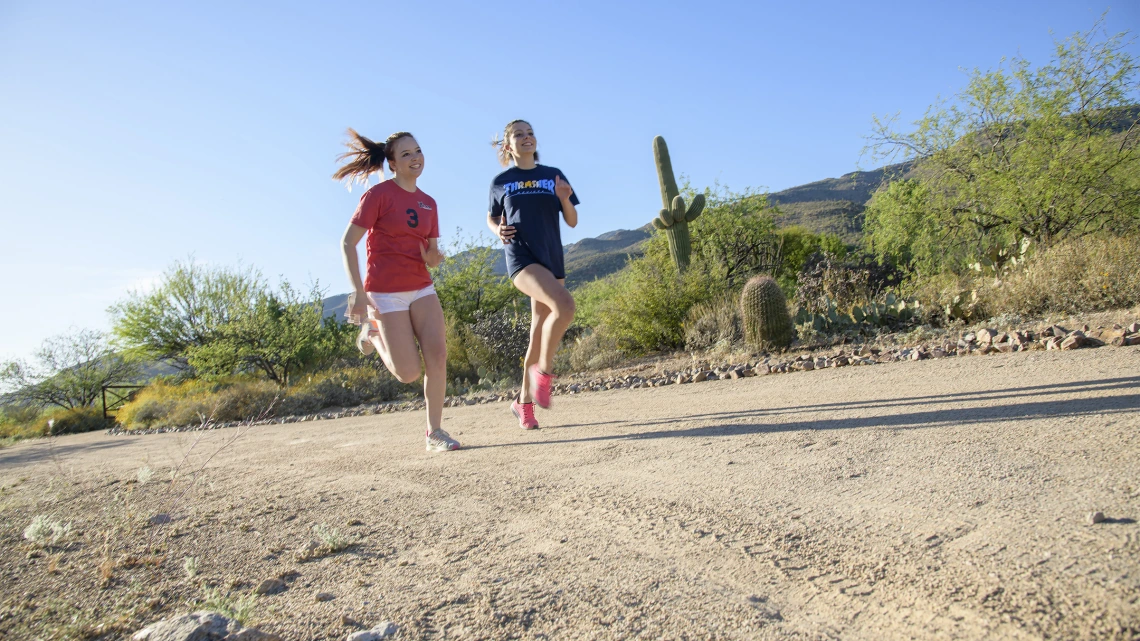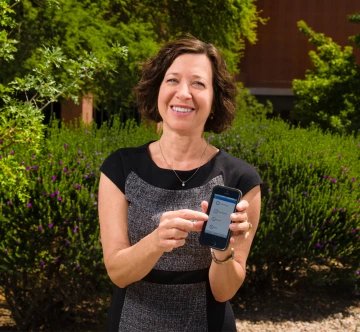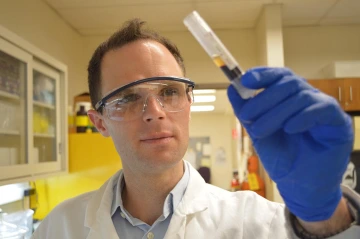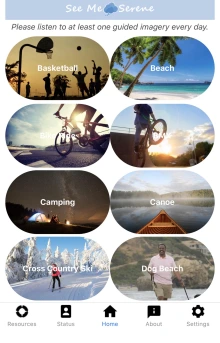Seeking Serenity: A Smartphone App for the COVID-19 Era
College of Nursing’s Dr. Judith Gordon hopes a new app can help people beat the stress induced by staying indoors during the pandemic.

Staying at home is important to reduce the spread of the virus that causes COVID-19, but many people miss enjoying the outdoors.
University of Arizona Health Sciences researcher Judith Gordon, PhD, associate dean of research for the College of Nursing, has devoted her career to finding ways to help smokers give up tobacco. She now hopes to apply her skillset to help people suffering from stress related to being cooped up inside all day, away from nature. That includes people staying home to reduce the spread of the novel coronavirus, as well as people with physical disabilities that keep them largely indoors.

Judith Gordon, PhD, brings computer scientists and health scientists together to use technology to solve health-related problems.
This project is based on her previous work, which led to the creation of a smoking-cessation smartphone app using guided imagery, a self-help technique in which a patient invokes a mental image that recreates a sensory perception. Dr. Gordon’s previous studies hinted that it could be an effective tool for smokers looking to kick the habit. Now, Dr. Gordon hopes what she’s learned from that work can be applied during the pandemic.
“Many studies are coming out showing dramatic increases in stress and effects on mental health from the COVID-19 pandemic,” Dr. Gordon said. “We hope to help people cope.”
Dr. Gordon is packing her guided-imagery expertise into an app that may help alleviate isolation-induced stress. Her team calls it “See Me Serene,” and it offers vividly narrated stories, told in the second person, describing experiences in nature.
Dr. Gordon believes her team will be the first to investigate the potential connection between access to the outdoors and COVID-19-related stress.
“Our app is focused on using a person’s imagination to create immersive experiences that make them feel as though they are outdoors and could potentially experience the benefits of people outdoors,” Dr. Gordon said. “It focuses on all the senses and emotions — the sights around you, smells in the air, what you hear, what you might be tasting, things you feel on your skin. All of that will evoke an emotional response.”
Putting the app to the test
Those downloading the See Me Serene app will be invited to take part in a 100-person study investigating its potential role in reducing stress. Dr. Gordon says her team’s main goal is to develop the app, test the feasibility of recruiting and retaining participants, and compare their stress levels before and after the intervention. It will be a pilot study with no control group.
“It’s a very promising line of research, but there hasn’t been an enormous amount of large-scale trials on guided imagery,” Dr. Gordon said.
In her small study, she’ll put the app to the test by collecting several samples of participants’ saliva before and after using the app’s guided-imagery program. In a College of Nursing laboratory, Thaddeus “Tad” Pace, PhD, will analyze the samples for cortisol.

Tad Pace, PhD, pictured here with a vial of blood, runs a research lab at the College of Nursing. He will analyze saliva for cortisol to gauge stress levels in See Me Serene study participants.
The link between stress and inflammation has its roots in the “fight or flight” response, a deep-seated evolutionary adaptation to threats in our environment. A surge of adrenaline and other hormones fuels this response, and cortisol levels rise and fall in synchrony as danger materializes and passes. The stress response can trigger inflammation in the body.
“Stress hormones and inflammation can be beneficial when we’re dealing with stress in the short-term — the fight-or-flight response. If that stress and anxiety hang around for longer periods of time, they keep that inflammation turned on,” Dr. Gordon said. “When that inflammation is turned on for long periods of time, it ends up not being healthy for us. Chronic inflammation and chronic stress affect how our brains function, and we may experience anxiety, posttraumatic stress or depression as a result.”
By looking at multiple snapshots of research participants’ cortisol levels, Dr. Gordon’s team will uncover clues about how stress levels might fluctuate before and after completing the guided-imagery program. The hypothesis is that, after using See Me Serene daily for four weeks, participants’ cortisol levels will decline. A successful pilot study may pave the way for larger and more sophisticated studies.

The See Me Serene app will have many outdoor scenarios for listeners to choose from.
“If this app can help people feel calmer and more relaxed, and it can interrupt that stress and inflammation cycle, that would be wonderful,” Dr. Gordon said.
Tapping into students’ talents to build the app
To bring See Me Serene to life, Dr. Gordon reached out to Chris Gniady, PhD, associate professor of computer science in the College of Science, to enlist the talents of computer science undergraduate students.
“Dr. Gniady is always looking for projects his students could work on, and I’m always looking for people who can program the crazy ideas I come up with for solving health problems. It’s mutually beneficial for computer science and health sciences to work together,” Dr. Gordon said. “It’s been a great learning experience for me, because I don’t know how to develop an app. The students have been teaching me a lot of the language around app programming, and what things one can and cannot do via an app.”
This cross-campus collaboration became an opportunity for students to apply programming skills to the community’s health.
“It’s a great opportunity for computer science students to partner with somebody in Health Sciences to solve a health-related problem. The students working on this project have really dived in, learning about what it means to combine computer science and research,” Dr. Gordon said.
Dr. Gordon cites her team’s diverse skills as a key ingredient to its approach.
“What’s so exciting about this particular project is it’s so interdisciplinary. We have computer science, nursing, psychology, family medicine and public health — all of these folks coming together, contributing their expertise to solving a really important public health problem,” Dr. Gordon said. “The most rewarding aspect of my work is being able to help people improve their physical and mental health.”

